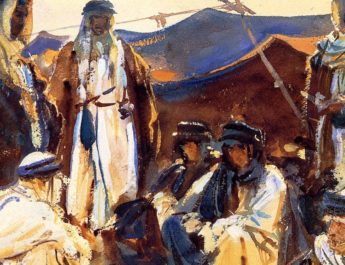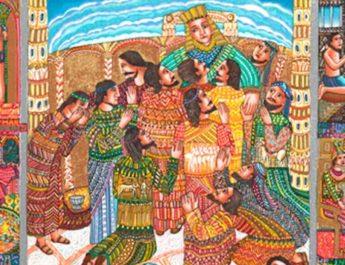Exodus 19:1-6 & 20:1-2
Narrative Lectionary
19:1 On the thirdA new moonB after the IsraelitesC had gone outD of the landE of Egypt,F
A “third” = shelishi. From shalosh (three, fork, triad). This is third or one-third of something.
B “new moon” = chodesh. From chadash (to renew, repair). This refers to a new moon. It can also mean monthly.
C “Israelites” = ben + Yisrael. Literally, “children of Israel.” Ben is from banah (to build or obtain children). This is son, age, child. It is son in a literal or figurative sense. Yisrael is from sarah (to persist, exert oneself, contend, persevere, wrestle, prevail) + el (God or god). This is Israel, meaning God strives or one who strives with God; new name for Jacob and for his offspring. This refers to the people and to the land.
D “gone out” = yatsa. This is to go or come out, bring forth, appear. It is to go out in a literal or figurative sense.
E “land” = erets. Root may mean to be firm. This is earth, ground, field land, or country.
F “Egypt” = Mitsrayim. Perhaps from matsor (besieged or fortified place, bulwark, entrenchment; something hemmed in; a siege or distress or fastness); from tsur (to confine, besiege, to cramp). This is Egypt.
on that very day,G they cameH into the wildernessI of Sinai.J
G “day” = yom. Root may mean being hot. This is the day in a literal or figurative sense. It can also mean birth, age, daylight, continually or other references to time.
H “came” = bo. This is to enter, come in, advance, fulfill, bring offerings, enter to worship, attack. It can also have a sexual connotation.
I “wilderness” = midbar. From dabar (to speak, command, declare). This is mouth or speech. It can also be desert or wilderness. Additionally, it can be used for a pasture to which one drives cattle.
J “Sinai” = Sinay. Probably from the same as Sin (Sin, a city meaning “clay” or “bush);{perhaps from asam (to gather, store) OR from seneh (thorn bush) OR related to Aramaic siyn (a god called Sin) OR perhaps Hebrew siyn (related to mud or clay)}. This is Sinai – a place whose name may mean “bush of the Lord” or “muddy.” See https://www.abarim-publications.com/Meaning/Sinai.html
2 They journeyedK from Rephidim,L enteredM the wilderness of Sinai, and campedN in the wilderness; Israel camped there in front ofO the mountain.P
K “journeyed” = nasa. This is properly pulling up as when one pulls up tent pegs or stakes. This would imply striking tents in order to start a journey. So this could be bring, pullout, set out, journey, or cause to go away.
L “Rephidim” = Rephidim. 5x in OT. From raphad (to spread, make a bed, refresh, comfort). This is Rephidim, meaning supports.
M “entered” = bo. Same as “came” in v19:1. See note H above.
N “camped” = chanah. This is decline, bending down, or living in tents. It can be camping to create a home or camping as a part of battle.
O “in front of” = neged. From nagad (to declare, make conspicuous, stand in front, manifest, predict, explain). This is in front of, opposite to. It can refer to a counterpart or partner, one corresponding to or in the sight of.
P “mountain” = har. From harar (hill or mountain). This is mountain, hill, hilly region.
3 Then MosesQ went upR to God;S
Q “Moses” = Mosheh. From mashah (to pull out in a literal or figurative sense, to draw out) OR from Egyptian mes or mesu (child, son i.e. child of…). This is Moses – the one drawn out from the water, which is to say, rescued. If derived from the Egyptian, his name would share a root with Rameses and Thutmose.
R “went up” = alah. This is to go up, approach, ascend, be high, be a priority; to arise in a literal or figurative sense.
S “God” = Elohim. Related to “Israelite” in v19:1. See note C above.
the LordT calledU to him from the mountain, “Thus you shall say to the houseV of JacobW and tellX the Israelites:
T “Lord” = YHVH. From havah (to be, become) or hayah (to come to pass, become, be). This is the name of the God of Israel, the self-existent and eternal one, the tetragrammaton. This pronunciation has been lost to time so “Lord” is generally used in its place.
U “called” = qara. This is to call or call out – to call someone by name. Also used more broadly for calling forth.
V “house” = bayit. Related to “Israelites” in v19:1. Probably from banah (see note C above). This is house, court, family, palace, temple.
W “Jacob” = Yaaqob. From the same as aqeb (heel, hind part, hoof, rear guard of an army, one who lies in wait, usurper). This is Isaac’s son and his descendants. The name means heel-catcher or supplanter.
X “tell” = nagad. Related to “in front of” in v19:2. See note O above.
4 ‘You have seenY what I didZ to the EgyptiansAA and how I boreBB you on eagles’CC wingsDD and broughtEE you to myself.
Y “seen” = raah. This is to see in a literal or figurative sense so stare, advise, think, view.
Z “did” = asah. This is to make, do, act, appoint, become in many senses.
AA “Egyptians” = Mitsri. Related to “Egypt” in v19:1. From the same as Mitsrayim (see note F above). This is Egyptian.
BB “bore” = nasa. This is to lift in a broad sense, literally and figuratively. So it could be to carry, take, or arise. It could also be bring forth, advance, accept.
CC “eagles’” = nesher. This is an eagle or vulture – some kind of large bird of prey. Its root may mean lacerate.
DD “wings” = kanaph. This is wing, edge, corner, extremity. It can also be a flap or fold of a garment or the pinnacle of a building.
EE “brought” = bo. Same as “came” in v19:1. See note H above.
5 Now, therefore, if you obeyFF my voiceGG and keepHH my covenant,II
FF “obey” = shama + shama. This is to hear, call, consent, or consider. It implies listening intelligently, giving attention, and, because of these two factors, obedience and action are often implied. The word is repeated twice – the first time as an Infinitive Absolute. The Infinitive Absolute serves to emphasize the sentiment of the word. It is rather like Foghorn Leghorn’s speech pattern, “I said, I said.”
GG “voice” = qol. This is a sound, used often for human voices. Also used when God speaks or angels, animals or instruments. It can be a cry or a noise, thunder or earthquakes and so on.
HH “keep” = shamar. This is to keep, watch, or preserve. It means to guard something or to protect it as a thorny hedge protects something.
II “covenant” = berit. Perhaps from barah (to eat, choose, make clear); perhaps from bar (grain, wheat); from bara (to select, purify, cleanse, test, brighten, polish). This is a compact, covenant, alliance, treaty, or league.
you shall beJJ my treasured possessionKK out of allLL the peoples.MM Indeed, the wholeNN earthOO is mine,
JJ “be” = hayah. Related to “Lord” in v19:3. See note T above.
KK “treasured possession” = segullah. 8x in OT. Root may mean to shut up – as treasure or wealth that is kept. Could be property, jewel, or any possession.
LL “all” = kol. From kalal (to complete). This is all or every.
MM “peoples” = am. From amam (to darken, hide, associate; creating shadows by huddling together). This is people or nation. It can be used specifically for a tribe, collectively of troops or armies, or figuratively to refer to a flock of animals.
NN “whole” = kol. Same as “all” in v19:5. See note LL above.
OO “earth” = erets. Same as “land” in v19:1. See note E above.
6 but you shall be for me a priestlyPP kingdomQQ and a holyRR nation.’SS These are the wordsTT that you shall speakUU to the Israelites.”
PP “priestly” = kohen. This is literally the one who officiates i.e. the priest. This is where the Jewish last name “Cohen” (and its variants) comes from.
QQ “kingdom” = mamlakah. From the same as melek (king, royal). This is kingdom, dominion, sovereignty, rule. It can also refer to the realm.
RR “holy” = qadosh. From qodesh (set apart and so sacred; God is different from us and so God is holy/set apart; things we dedicate to God’s service are set apart for God and so they, too, are holy); related to qadash (set apart, consecrated, hallowed, sanctified; something or someone set apart for a holy purpose or use – ceremonially or morally clean). This is sacred or holy in a ritual or moral sense. As a noun, it refers to a holy one (like a saint or angel), a holy place (the sanctuary), or God (the Holy One).
SS “nation” = goy. From the same root as gevah (the back, person, or body); related to gev (among); related to gaah (to rise up). This is nation or people. Often used to refer to Gentiles or foreign nations. It can also be used figuratively for a group of animals. This is where the Yiddish “goy” comes from.
TT “words” = dabar. Related to “wilderness” in v19:1. From dabar (see note I above). This is speech, a word, a matter, an affair, charge, command, message, promise, purpose, report, request. It is a word, which implies things that are spoken of in a wide sense.
UU “speak” = dabar. Related to “wilderness” in v19:1 & “words” in v19:6. See note I above.
20:1 Then God spoke all these words,
2 “I am the Lord your God, who broughtVV you out of the land of Egypt, out of the house of slavery;WW
Image credit: “Holding the Sun” by Zach Dischner, 2009.




